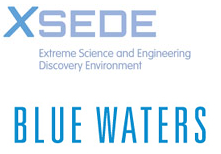 The National Science Foundation (NSF)-funded Blue Waters and eXtreme Science and Engineering Discovery Environment (XSEDE) projects are hosting the 8th Extreme Scaling Workshop August 14-15, 2014, at the University of Colorado, Boulder.
The National Science Foundation (NSF)-funded Blue Waters and eXtreme Science and Engineering Discovery Environment (XSEDE) projects are hosting the 8th Extreme Scaling Workshop August 14-15, 2014, at the University of Colorado, Boulder.
The conference committee seeks submissions of excellent quality addressing the challenges of using, designing, deploying, or integrating infrastructure for both big data analysis and large-scale computation to facilitate scientific discovery. The Extreme Scaling Workshop 2014 will showcase the discoveries, innovations, and achievements of those who use, build, and/or support advanced architectures at extreme scales around the world. The workshop will also provide a forum among researchers, professional staff, students, HPC center staff, and representatives from funding agencies to explore and discuss current successes and challenges as well as future needs and plans.
The proceedings for the workshop will be submitted to the IEEE Xplore digital library.
- Data-intensive applications running on HPC-style architectures
- Big data analytical applications running on HPC-style architectures
- Computationally intensive applications running on big data or data-intensive architectures
- Using GPU/many-core processors for big data applications
- System architectural features that can support big data and high-performance computing
- Performance evaluation of systems that support big data
- Big data algorithmic and application methods and overlap with computational algorithms
- Resource management issues related to merging big data analytics and computational workflows on the same systems
- Data storage sub-system performance and comparisons
- Explanations of big data applications and how they may use more traditional HPC architectures effectively
Two types of submissions are encouraged from scientists, engineers, scholars, and high-performance technologists from colleges, universities, laboratories, industry, HPC centers, and other organizations conducting related work.
1. Abstracts for papers that include title, abstract, and names and institutions of authors/presenters. Abstracts should be no more than two pages in length and provide sufficient detail for the workshop committee to make informed judgments about the work. Abstracts should include the names and affiliations of all co-authors and indicate which author will be presenting. Authors whose abstracts are selected will be asked to submit a full paper by July 1, 2014, and to provide a 30-minute presentation during the workshop. Full papers should follow the guidelines established by the IEEE.
2. White papers that identify needs and requirements for improving the computing environment for big data analysis and computational simulation to facilitate large-scale scientific discovery. Please provide a description (at least two paragraphs but at most two pages) of the desired improvement(s), including your name, institution, and how the improvement will enhance scientific discovery. The white papers should address the top three improvements that will benefit the community. The workshop committee will select a few white paper authors to be members of a lightning round panel to each speak about the proposed improvements, and to foster discussion among the workshop participants.
There will be break-out discussions after the paper presentations and after the panels on needed improvements. Workshop proceedings will include the accepted papers and white papers and a summary of recommendations from the discussions among the presenters and participants.
At least one author of each accepted full paper and white paper must participate in the conference to present and discuss their work.
Send questions and submissions to Scott Lathrop at lathrop@illinois.edu by May 1, 2014.
Notice of acceptances will be issued by May 15, 2014.
Additional information is available here.
About Blue Waters
Blue Waters, one of the world’s most powerful supercomputers, enables scientists and engineers across the country to perform breakthrough research. With the Blue Waters petascale system, researchers can tackle the largest, most challenging compute-, data-, and memory-intensive problems—working with massive datasets and performing quadrillions of calculations every second. The project is funded by the National Science Foundation and located at and managed by the National Center for Supercomputing Applications.
About XSEDE









